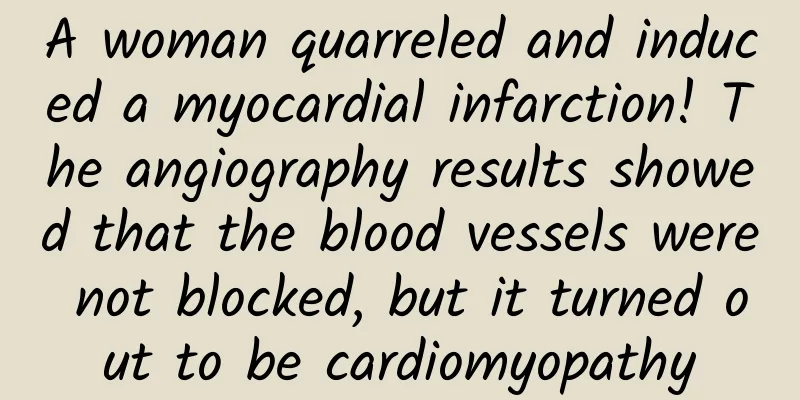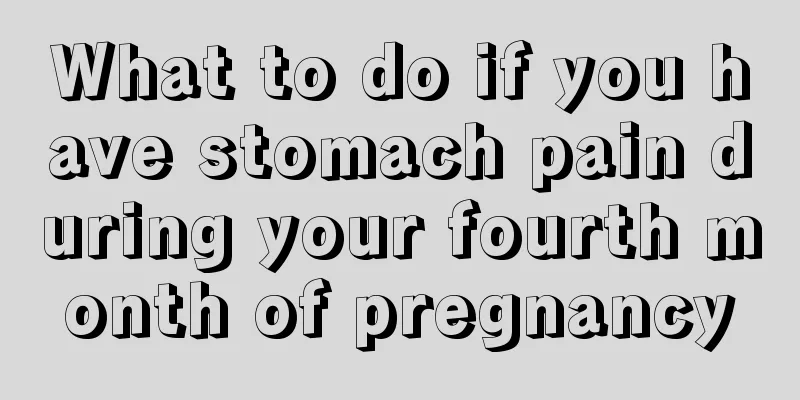A woman quarreled and induced a myocardial infarction! The angiography results showed that the blood vessels were not blocked, but it turned out to be cardiomyopathy

|
Ms. Zhao, 59 years old, had a quarrel with her daughter-in-law over household chores and suffered a "myocardial infarction"! You may not have heard of such cases, but we encounter them every year. Quarrels can lead to true myocardial infarction as well as false myocardial infarction. At 8 o'clock in the morning, Ms. Zhao and her daughter-in-law quarreled over some trivial household matters. Her son was always caught in the middle and didn't know what to do, so when the mother-in-law and daughter-in-law quarreled, her son would slip away early. Normally, Ms. Zhao would get better in half a day at most, at least it would not affect her eating, drinking, defecating or urinating. But this time, Ms. Zhao was lying in bed all the time, so her family felt something was wrong and advised her to go to the hospital. The cardiologist diagnosed acute myocardial infarction, which could be confirmed with an electrocardiogram and myocardial enzymes. So I rushed to the catheterization room to prepare for angiography and possibly stenting. The essence of myocardial infarction is the rupture of plaques in the heart and blood vessels, which causes thrombosis. The thrombosis blocks the heart and blood vessels, causing myocardial infarction. Anger is indeed a factor that induces plaque rupture. There is also a possibility that anger may cause vascular spasm, leading to spasmodic myocardial infarction. Studies have found that when we are angry, the risk of sudden cardiac death will increase by 7 times, so we have been educating everyone not to get angry and to maintain a good attitude. So what is the name of Ms. Zhao's heart disease? Is it dangerous? This type of heart disease is often related to emotions, so it is called stress cardiomyopathy. It is a sudden thinning of the left ventricular myocardium. When filled with blood, it is like a balloon or an octopus's head, so it is also called myocardial ballooning or octopus crown heart disease. The symptoms of this heart disease are almost identical to those of myocardial infarction, such as severe chest pain, a feeling of pressure behind the sternum, difficulty breathing and syncope. The electrocardiogram will also be the same as that of myocardial infarction, and even myocardial enzymes will be elevated, so we often diagnose it as acute myocardial infarction. A good attitude is the basis for preventing heart disease: Because the cardiomyopathy caused by anger is relatively mild, if it triggers myocardial infarction, the danger is greater. An article published in the journal Circulation shows that strong emotions or actions can cause sympathetic nerve excitement and increase the body's catecholamine levels, leading to increased blood pressure and heart rate, vasoconstriction, and even plaque rupture and thrombosis, causing myocardial infarction. Therefore, please stay positive, sunny, optimistic and grateful. I advise everyone not to get angry, as anger may cause stress-induced cardiomyopathy or acute myocardial infarction. The person who makes you angry will be fine, but you will be the one who harms your body! |
>>: How come my eyes became nearsighted when they are in good condition?
Recommend
Symptoms of seventy days of pregnancy
Pregnancy is very important for female friends, b...
What should I pay attention to when bathing after caesarean section?
Nowadays, many women choose to have a cesarean se...
What to do if you feel irritable during your period
Menstruation is what we usually call period. We a...
What is the nutritional value of sea buckthorn fruit? How to eat sea buckthorn fruit
The vitamin C content in seabuckthorn fruit is mu...
Can cornea be malnourished? A brother and sister both need corneal transplants
Blurred vision was caused by corneal dystrophy. T...
What to do if menopausal bleeding does not stop
The reason why menstrual bleeding does not stop d...
Pregnant woman's hands swollen when she wakes up in the morning
The process of pregnancy is very difficult and it...
What are the causes of intrinsic endometriosis?
Intrinsic endometriosis is one of the common dise...
Women who often play with their mobile phones tend to become older and uglier
In this technological age, people’s lives have ch...
What kind of vaginitis is vulvar itching?
There are many types of vaginitis. Vulvar itching...
What should women do if their gums are swollen and painful during menstruation?
Swollen and painful gums have a certain impact on...
Can pregnant women drink cassia seeds?
Many people like to drink Cassia seed tea, mainly...
The motor functions are gradually lost and the body feels like it is frozen. Is there no cure for this disease?
Author: Xing Yan, Chief Physician of Aviation Gen...
Will cervicitis affect menstruation?
Cervicitis is a relatively common gynecological d...









